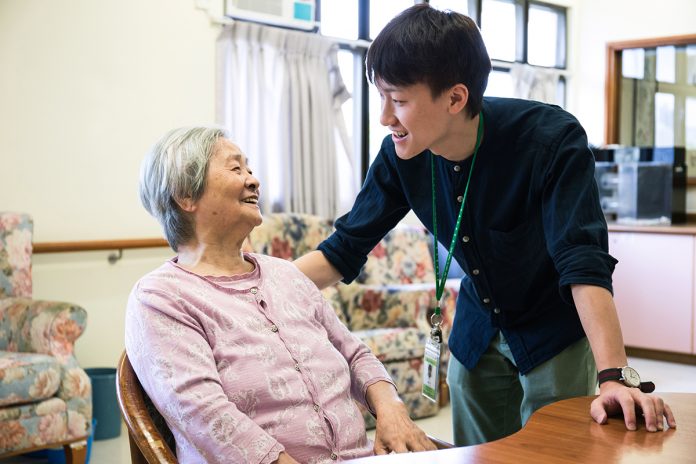Professor Timothy Kwok, Director of Jockey Club Centre for Positive Ageing lifts the lid on the development of a unique dementia care centre in Hong Kong
Care of the ever-increasing number of older people with dementia is a major challenge to most countries worldwide. Hong Kong is no exception. As the great majority of the care costs are met by families, the support for family caregivers is of paramount importance in the design of dementia care policy.
This was the primary motivation behind the collaboration between the Chinese University of Hong Kong and the Hong Kong Jockey Club in setting up of Jockey Club Centre for Positive Ageing (JCCPA) in 2000. The core service is to provide day and respite care to people with dementia. We have 76 daycare places and 17 beds on a separate floor for respite/residential care. In contrast with other residential homes, during the day, all residents under respite/residential care join in activities on the other floors for daycare.
JCCPA provides social stimulating activities and physical activities which have proven benefits to cognitive and general health of older people with dementia. As we do not receive any public funding, the centre has been run as a self-financing non-government organisation. To ensure quality service, we adopt the person-centred care approach and enforce a restraint-free environment. Our care staff are multidisciplinary and we have other visiting professionals providing more specialised services, for example, music therapy, podiatry, family counselling, dietetic on an ad hoc basis. Recently, we have extended our service to transitional care for people with dementia who have become deconditioned by a hospital stay for acute illnesses.
One single care centre has limited social impact. That is why JCCPA has been active in dementia care research, training and public education. In research, we have demonstrated by randomised trials that family caregiver training delivered online or via telephone is effective in improving family caregiver self-efficacy,1,2 calligraphy improves spatial orientation in older people with dementia,3 cognitive training with or without client empowerment programme improves the cognitive function of older people with cognitive impairment (in press).
In caregiver training, we held a series of talks on dementia care which are open to family caregivers. We have built a website for family caregivers (adcarer.com) to provide information on the skill of dementia care and relaxation methods. We have held training courses for full time foreign domestic helpers.
In professional training, we started a one-year advance diploma course in dementia care four years ago. In collaboration with University of Stirling, Scotland, through more than 200 facilitators that we have trained, we have delivered the Jockey Club Best Practice in Dementia Care programme to over 1,100 care staff in nursing homes, hospitals and day care centres. Evaluation of this training programme indicated that knowledge and attitude in dementia care has been enhanced. More importantly, the course has promoted cross-agency engagement and empowerment.
When it comes to the education of the public on what we do, we have launched several territory-wide educational programmes to promote positive knowledge and attitude towards dementia among the general public and to establish a dementia-friendly Hong Kong. In 2010, we launched a public campaign to change the Chinese translated term of dementia which had very negative connotations. Out of over 1,300 proposed new terms, the term “brain degeneration syndrome” was chosen. This was widely reported in the public media and has been used by the media ever since. The initiative also prompted the local medical community to change the term to “cognitive impairment syndrome”. In addition, our two-year “Jockey Club ‘Dementia Friendly Communities’ Campaign” delivered talks and workshops to over 4,000 people in public and private sectors about how to help people with dementia in their neighbourhood and workplaces. Since then, the Social and Welfare Department has launched the territory-wide dementia friend campaign.
With the funding support from the Hong Kong Jockey Club, we are due to launch an online simple cognitive screening test to promote early detection of dementia. This will be followed by clinical diagnosis by trained primary care doctors and post-diagnosis support which seeks to empower and facilitate advance care planning in family caregivers and care recipients.
Over the years, JCCPA has evolved into a unique dementia care centre which combines service, training, research and public education. Looking ahead, we shall continue to innovate in dementia care models, particularly in the application of technology in dementia care. With the expected rapid increase in demand for quality dementia care services in Hong Kong, Mainland China and South East Asia, our centre is well placed to be a regional professional training centre for dementia care.
References
1 Kwok T, Au A, Wong B, Mak V, Ho F. Effectiveness of online cognitive behavioral therapy on family caregivers of people with dementia. Clinical interventions in aging. 2014;9:631.
2 Kwok T, Wong B, Chui K, Young D, Ho F. Telephone-delivered psychoeducational intervention for Hong Kong Chinese dementia caregivers: a single-blinded randomized controlled trial. Clinical interventions in aging. 2013;8:1191.
3 Kwok TC, Bai X, Kao HS, Li JC, Ho FK. Cognitive effects of calligraphy therapy for older people: a randomized controlled trial in Hong Kong. Clinical interventions in aging. 2011;6:269.
Please note: This is a commercial profile
Professor Timothy Kwok
Director
Jockey Club Centre for Positive Ageing (JCCPA)
Tel: +852 2636 6323












Thanks for sharing. Demographic shifts across the world are going to require a huge collaborative effort in the healthcare industry to care for people with dementia across all stages. Unless we find some kind of game-changing healthcare solution.